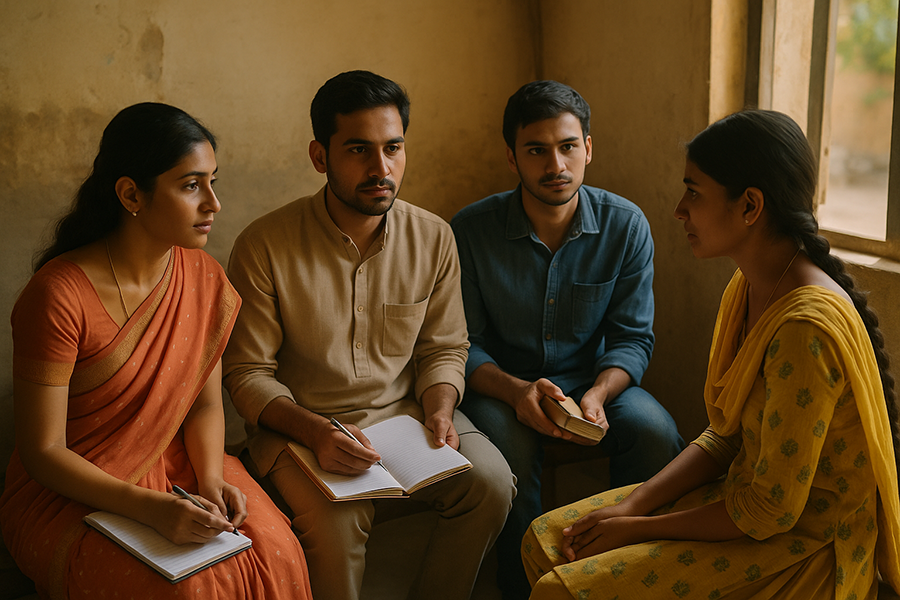As we get ready to welcome the Class of 2021-2022, here’s a sneak preview of the exciting curriculum that we have curated for our future cohorts of Development Management Professionals.
The new academic year begins on July 26 ,2021 with a special Term Zero devoted to building a core skill set that is crucial to the initiation of the PGP DM courses in August, 2021. It includes sessions on Excel, Data Analysis, Communication, Learning via the Case Study Method with an overarching understanding of India’s Development Story along with the Personal Mastery for Development Leadership session.
Simultaneously, the Academic team organises a special welcome with a Baithak, an opportunity for knowing the cohort’s session and knowing the people and context sessions for the students.
With this, the students make the transition to Term One. The programme then runs through 47 weeks across eight terms with 22 courses and workshops ranging from Perspectives on Society and Development; Understanding the Development Ecosystem; Designing Interventions; Organisation Management functions; to bringing it all together for sustainable impact at scale in Term Eight.
Essentially, the edifice of the PGP DM program is built on nine signature components:
⇒ ‘Personal Mastery for Development Leadership’ course, spread over 7 terms which is anchored in the need to build in the students the spirit of curiosity, courage and compassion. It believes in creating safe space for teams to flourish and thrive, encouraging generative conversations for collaboration, relating with diverse others, acting with positive emotions, emotional resilience and building attentional focus.
⇒ CBCL (Context-Based Collaborative Learning) course; a unique offering at ISDM has experienced Bricoleurs working with students on a one-to-one basis and in groups to discuss their individual learning journeys and also to discuss key development lenses to differentiate Management for the Social Sector like – Collaboration, Equity and Social Justice.
⇒ RI (Realising India) experience which as a part of CBCL is a two week structured immersion program planned for the students between terms 2 and Term 3. It enables the students to develop a deep understanding of the people’s lives in the district which prepares them to design interventions.
⇒ The Development Management Writing Centre which in its inaugural year at ISDM focuses on equipping students with the skills to communicate effectively (write, tell and present) with a clear demonstration of the characteristics of the development sector. This includes using a language that is specific and appropriate to the development sector, including the right choice of words and a tone that recognizes the complex nature of social change and the emergent nature of this work. This will be reinforced with ‘Writing in the Discipline’ sessions throughout the year.
⇒ Sessions with Eminent speakers and established leaders who from different walks of life are invited for live sessions at ISDM, all through the year to help the students debate, discuss, pause, reflect and learn through these live interactions.
⇒ Compulsory Harvard manage mentor course where students complete Harvard Business Publishing Courses covering management topics such as performance measurement, business plan development, strategy planning and execution, and more adding to their learning repository.
⇒ Special curated workshops which cover a range of topics from Group Dynamics, Radical Transformation Leadership (RTL) to future forward workshops on Networks, Partnerships and Alliances for Scale, Fund Raising, Project Management, Volunteer Management and Instructional Design.
⇒ Unique course offerings with a mix of Development Management and Business Management fundamentals that help to create the firm foundation for the students to lead and manage Social Purpose Organisations (SPOs). These include courses on Financial Perspectives, Strategic Innovation for Social Change, Operations Management for Quality and Impact, Behaviour Change Communication, Marketing Management, Human Development in an Unequal World to Technology and Management, Corporate Social responsibility. ‘New age’ electives like Behavioural Sciences in Social Change, Introduction to Digital Marketing and Social Entrepreneurship are also offered to students.
⇒ The Special Capstone Project in the final term with its focus on scale and sustainability, provides the students with a frame of reference to work on live projects with client organisations thereby integrating their learnings of the previous terms with a real, viable scaling strategy for the SPO.
Eventually our students will emerge from the PGP DM program as authentic development professionals with the knowledge, attitude, skills and tools to build a career in Development Management.




